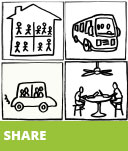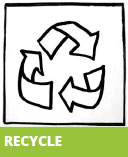You can help yourself and the planet with a few changes in consumption habits. Click on any icon to find out how.
Critiques of Pure Consumerism
As Susan Delacourt points out in her incisive book Shopping for Votes, we have increasingly come to think of ourselves as consumers (or, at best, taxpayers) as opposed to citizens—a mindset that leads us to put short-term wants ahead of real needs. David Harvey sees far too many people engaging in “a kind of mindless consumerism which tries to compensate for absent meaning in a world in which there are very few meaningful jobs.” The consumption economy may once have delivered for a while on its promise of mass contentment, but study after study shows us that it’s not happening now. As James Wallman notes, “mass production and mass consumption has ultimately led to mass depression” if only because of the difficulty of maintaining one’s status in that game.
Not to mention the environmental cost of over-consumption. Environmental activist Annie Leonard has been one of the clearest critics of consumerism with the smart and righteous campaign that began with her 2007 Story of Stuff video, shown below. You can hear more about The Story of Stuff Project in this splendid one-hour interview with Annie. Unlike Wallman, who recommends that we redirect our competitive impulses from buying things toward buying experiences, Leonard is hopeful that we can make a more fundamental change by buying less, competing less and coming to realize the wisdom of the commons.
And from a generation ago, here’s a brief defence of voluntary simplicity from Small is Beautiful author E.F. Schumacher (1911-1977):
For a thousand examples of the benefits of light living, take a moment to explore the Slow Ottawa Pinterest board. (Click on an image to share, or on the board title to see all items.) And thanks if you can share using the buttons at the bottom of this page.








